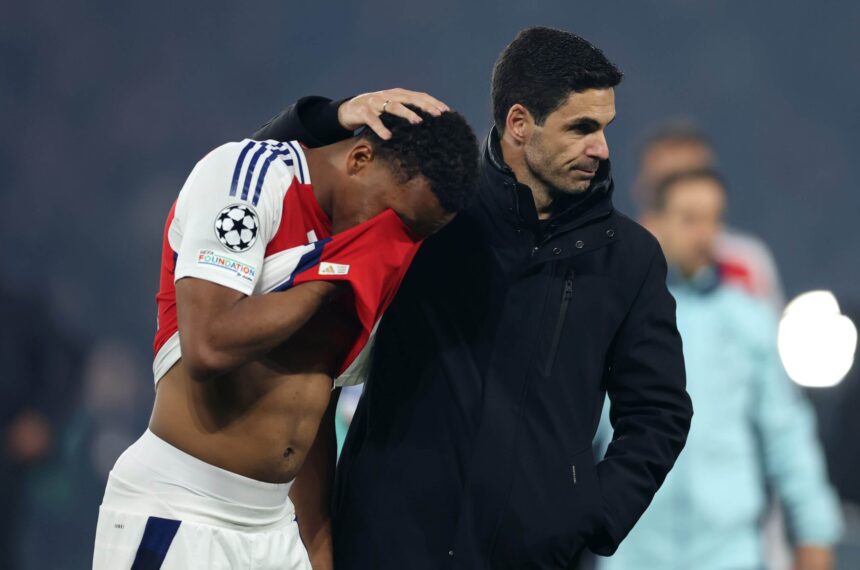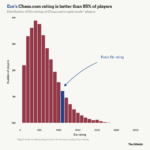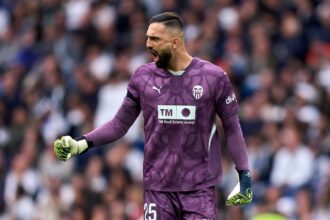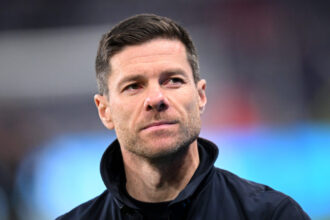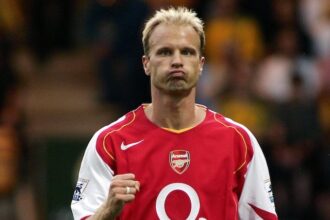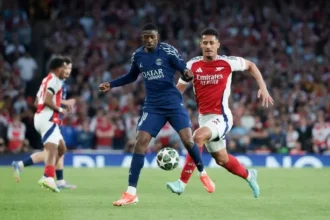After their elimination in the Champions League semi-finals by Paris Saint-Germain this week, it will now be five years without a trophy for Mikel Arteta’s Arsenal.
In the summer of 2020, amid the Covid-19 pandemic, both Arsenal and Liverpool had the strange mischance to lift silverware in empty stadia: Liverpool were crowned Premier League champions in an Anfield devoid of fans, while Arsenal won the FA Cup final in a cavernous, echoing Wembley Stadium.
Advertisement
Both clubs resolved to get back to the podium to share such a moment with their supporters as soon as possible.
While Liverpool have since won an FA Cup, two Carabao Cups and, this season, another Premier League, Arsenal are still awaiting their next opportunity to celebrate.
They are on course to finish as Premier League runners-up for a third consecutive season, and also reached the semi-finals in two of the campaign’s three cup competitions, yet lost both legs of each tie. So near yet so far.
And Arteta insists his team are close to glory.
“We are there,” he told a press conference on Friday. “With the amount of points that we have generated in the last few seasons (89 in 2023-24, two behind champions Manchester City, and 67 with three games left this time), we could have two Premier Leagues … We are providing the numbers that win you titles. We have to be a little bit luckier or still do better, (so) that nobody has that season better than you.”
Whether down to luck or quality, the wait goes on.
In the immediate aftermath of elimination against PSG, Arteta stated he hadn’t seen a better team than Arsenal in this season’s Champions League — comments he doubled down on during his Friday press conference to preview the weekend trip to face Liverpool at Anfield: “When you look at the important stats that normally give you the best platform to win football matches, it’s crystal clear who was better.”
The underlying data may support Arteta’s argument, but his comments nevertheless come across as somewhat defensive. Are they indicative of a manager who is beginning to feel the pressure?
A Champions League final appearance was not to be for Arsenal on Wednesday in Paris (Richard Heathcote/Getty Images)
If he is, that pressure must come either from external factors — increasing media scrutiny, for example — or from the demands he places upon himself. Arteta is driven by a burning desire for success. “Not winning trophies bothers me a lot because I love winning and absolutely hate losing,” he admitted on Friday.
Advertisement
Within Arsenal, Arteta’s position is not under any threat. He retains the support of the board and signed a new three-year contract last September. In the five and a half years since his appointment, Arsenal have gone from mid-table mediocrity to challenging for the biggest prizes domestically and in Europe. The trajectory has not always been perfectly linear — Arteta admitted Arsenal have “gone a step backwards” in this season’s Premier League — but the overall improvement is inarguable.
Anecdotally, most supporters seem to share the view of Arteta as the driving force behind Arsenal’s climb back into the elite. Many recognise the trying circumstances he has worked under this season and credit him with managing to steady the ship.
For all the talk among rival supporters of massive expenditure and trophyless seasons, that has not been a dominant narrative in the stands at the Emirates Stadium — not until now, at any rate.
Should five years without a trophy become six, however, that could change.
Arteta is right: Arsenal are so close. They do so much right. But the final step, that conversion from challengers to champions, may well be the most difficult to take.
There is enough mitigation in this season for most of the club’s supporters to rationalise the lack of silverware.
“With the league, there have been two main reasons,” Arteta said. “One is the amount of games and time that we have played with 10 men, and then the availability of the squad throughout the 38 games. It’s very, very difficult to manage and to have very strong performance consistently. We dropped a lot of points, we dropped a lot of points when we were ahead as well, which is something that really needs to improve.
“And with the Champions League, maybe we lacked when we had to change the game in certain moments and have that freshness. We were unable to do that.”
Advertisement
There is clarity around how Arsenal must improve.
After the defeat against PSG, Arteta returned to a regular theme: the importance of efficiency and match-winning talent in the penalty area.
“The Champions League is decided in the boxes,” he declared in Paris. “In one of the two boxes, somebody has to do something special to win it for you and make it happen, and that was the difference.”
That analysis will be familiar to Arsenal fans. This was Arteta speaking after last season’s elimination against Bayern Munich: “It was a game that you could see either an error or an individual, or magic moment that would decide the tie. The margins are so small. We didn’t defend our box well at all in that action and we ended up throwing everything and trying everything, not having enough to score a goal.”
Arsenal need more magic moments, more special contributions in the final third.
Arteta sounds like a man who knows what needs to be done — now the onus is on him and the club to do it. Next season is huge for Arsenal, but before that there’s a critically important summer transfer window.
If Arsenal were to come up short again a year from now, even if by the slimmest of margins, the fans may begin to question whether the Spaniard is the man to take them that final step.
Perhaps that would be unfair, but it’s also the reality of elite sport. Those fine margins Arteta speaks of turn some into heroes and others into scapegoats.
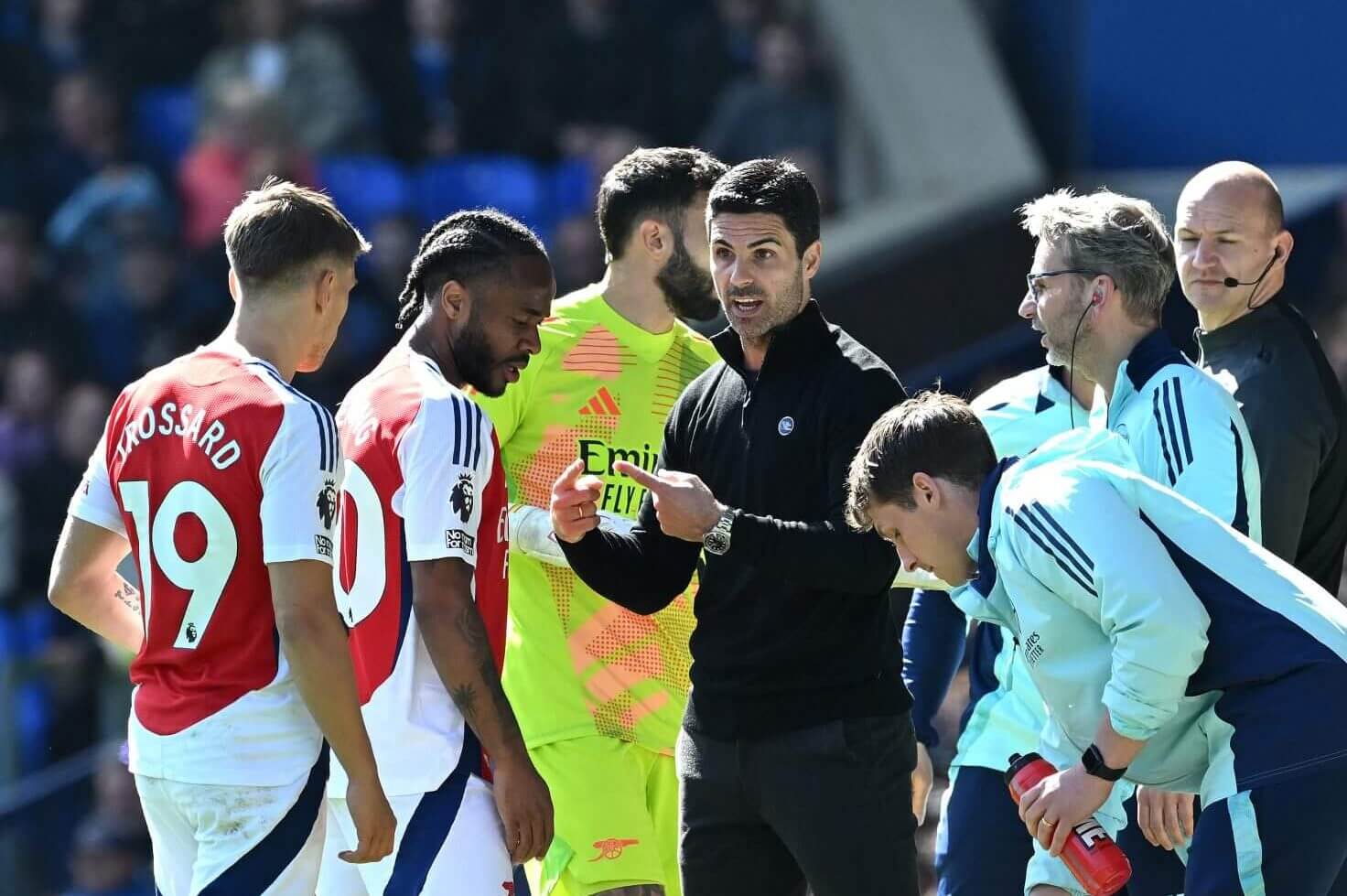
(David Price/Arsenal FC via Getty Images)
The real clock Arteta may be competing against will not be set by media or supporters, but by his own players. Arsenal have a gifted group in their collective prime, with some clear tent-pole stars. A spine that includes William Saliba, Declan Rice and Bukayo Saka provides an excellent foundation for winning things, but also a defined window of opportunity.
Ultimately, the continued faith of those players will be of paramount importance. As long as they believe they can win things under Arteta, his place is likely to be secure.
Advertisement
Arsenal’s manager has no doubts regarding his team’s conviction at present. “I know how much they are still hurting,” he says. “Now we have to show the fight and how much we care about what is happening. And what we still have to achieve, which is a big thing because we haven’t done it yet … We have to prove that we can do it.”
This summer, the likes of Saliba, Saka and centre-back Gabriel have two years remaining on their contracts and Arsenal have opened talks with Saliba over a renewal. Securing their commitment would strengthen Arteta’s position and increase optimism that Arsenal can yet win trophies with this set of players. If talks drag on and Arsenal end a campaign empty-handed again next year, the picture will be somewhat different.
Arteta declined to offer a full assessment of their 2024-25 campaign just yet — there are still three games to go. “I cannot do it until we see how we see how we finish,” he said.
It’s important, then, that Arsenal now rally and recover their form over the final two weeks of their season. A strong finish, followed up with efficient recruitment and retention work this summer, and Arteta will have every reason to believe his team will be there or thereabouts come the spring of 2026.
And at the end of that long road back, they will have one further, vital step to take.
(Top photo: David Rogers/Getty Images)


